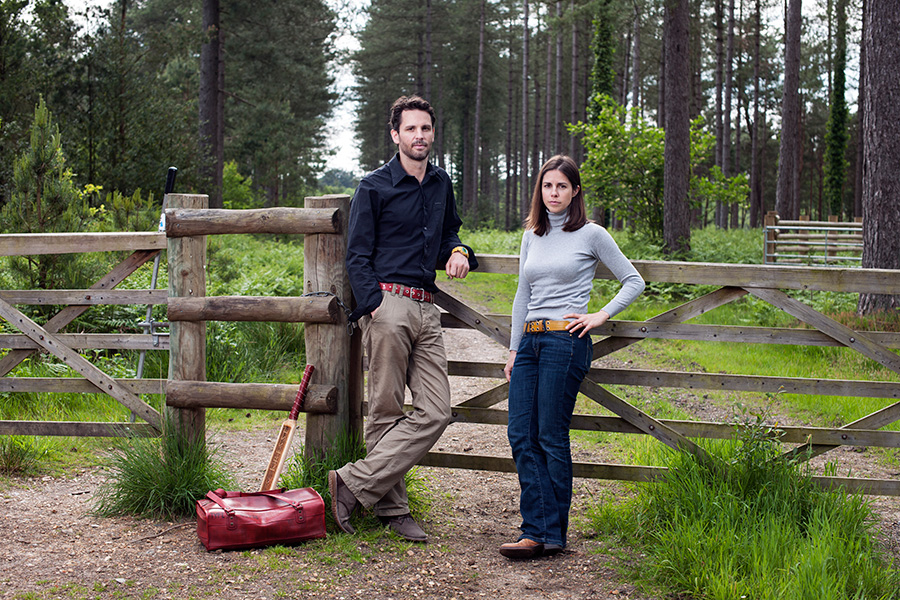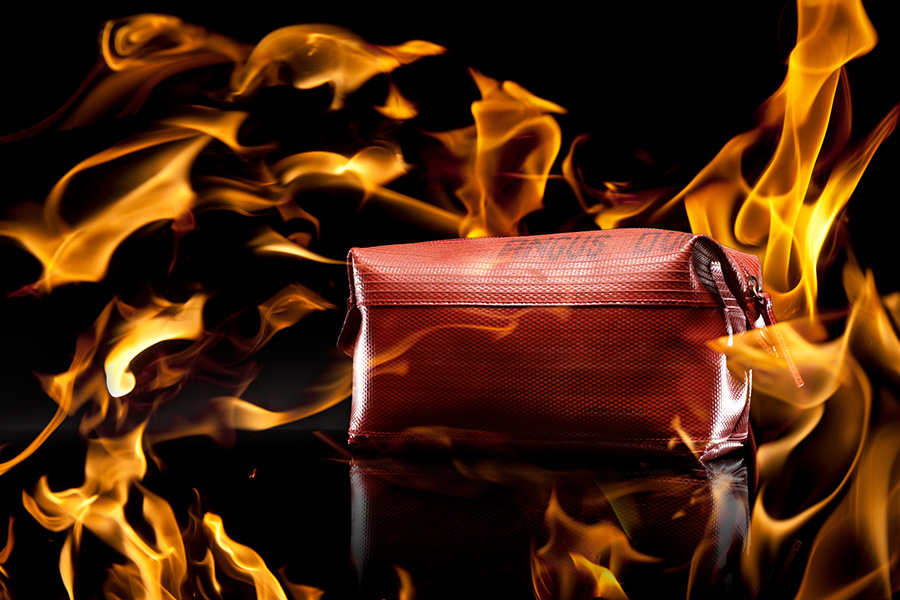You won’t find any discarded firefighting hose lying around London. It’s all been turned into handbags by Kresse Wesling and her husband Elvis (above). The pair are founders of Elvis & Kresse, a luxury brand that uses “heroic” waste as the main material in their line of bags and accessories.
Kresse has had a love affair with waste ever since she moved from Western Canada to Hong Kong. The shock turned her into an environmentalist. “I spent a lot of my time camping and hiking in unspoilt, natural beauty until I was 17 years old. Then I moved to Hong Kong where I saw the untreated sewerage of seven million people running directly into the sea,” she recalls. “What should have been shark infested waters was barren because sharks couldn’t hunt – they couldn’t smell their prey.”
Not political by nature and not designed for the corporate world, Kresse decided to pour her newfound passion into recycling. She met Elvis on a boat in Hong Kong and they moved in together the next day. “I fell in love with him immediately,” she says, “and it was the same with the fire hose when I discovered it, because it’s a story that you can fall in love with.” The couple moved to London in 2004 and they where they were shocked at how heavily reliant the U.K. was on landfill. “Such a small island with so many people, with no land to spare,” says Kresse. “Yet 100 million tons of waste was being buried every year.” During an environmental management course Kresse discovered the London Fire Brigade’s decommissioned fire hose.
 After a distinguished career fighting fires and saving lives; that could last up to 25 years; the hoses were destined for landfills. London had a whole team dedicated to patching and refurbishing them, but ultimately they were shipped off and buried. “Landfill was an indecent end for such a heroic material,” thought Kresse. She started rescuing them and wondering how they could be put back into service under the guise of fashion. The catalyst came quite by chance. Elvis had inherited an old belt from his father that had developed cracks in the leather. He decided to replace the leather with fire hose and while fixing the old belt buckle to it’s this new sturdy material, Kresse got a call from the team working on merchandise for London’s Live Earth concert.
After a distinguished career fighting fires and saving lives; that could last up to 25 years; the hoses were destined for landfills. London had a whole team dedicated to patching and refurbishing them, but ultimately they were shipped off and buried. “Landfill was an indecent end for such a heroic material,” thought Kresse. She started rescuing them and wondering how they could be put back into service under the guise of fashion. The catalyst came quite by chance. Elvis had inherited an old belt from his father that had developed cracks in the leather. He decided to replace the leather with fire hose and while fixing the old belt buckle to it’s this new sturdy material, Kresse got a call from the team working on merchandise for London’s Live Earth concert.
They were looking for something green for the event and Kresse impulsively offered them 1,000 belts made from fire hose. After experimenting with different ideas, they realized that their products needed to emulate classic luxury items, the iconic accessories that form part of permanent collections of major fashion houses. But their battle had just begun; they couldn’t find a British manufacturer to share their excitement, rarely getting further than a phone call with disinterested factory owners. They had the same response in other European countries too, until they discovered a small, family-run factory in Romania that was willing to help. “They had three vital qualities,” recalls Kresse.
“A gap in their production schedule, a serious pedigree of production for major luxury brands, and they believed (as we did) that the fire hose deserved to be treasured, something of beauty in it’s own right.” The range Elvis & Kresse handbags, wallets and belts soon began looking like the coveted items seen in leading luxury retailers. A meeting with Donna Karon saw the fashion icon agree to stock the items in her New York store, Urban Zen. More materials soon followed, with some of their handbags now lined with reclaimed military-grade parachute silk. Kresse has always had an obsession with waste and likes nothing better than discovering and intercepting something new.
She can be found six days of the month tramping around industrial waste yards in her Wellington boots sourcing new materials. The challenge is the same every time – what can they do to prove value, change perception, and respect these resources. “Fall in love with a problem,” she says. “If you’re fixing something there is a sense of purpose, which can push you through the difficult, early years. Creating something new, that no one else has, can make you unique and in demand. This works for both waste and luxury,” she says.
“We dream of a time without landfill, when everything is recycled or composted. Between now and then we know there are far too many incredible materials that will either languish under ground or suffer the indignity of incineration; when that happens we lose, we lose quality, narrative, and the opportunity to do something great,” says Kresse of the couple’s business vision.
The pair have interceded in a waste supply chain, choosing story laden materials of incredible character, and do everything they can to ensure their second life is as long as possible. They are constantly searching for more materials to grow their range of bags, belts and wallets, and have so far rescued over 200 tons of waste. The business has grown to a point where it now collects and uses all the discarded fire hose in the city of London.
Kresse and Elvis decided from the start that the role of a fire fighter is one of bravery, loyalty and devotion to public service and that the materials they collected from fire departments around London should in some way benefit them too. They donate 50% of their profits to the Fire Fighters Charity (FFC), an organization that has already supported hundreds of thousands of fire and rescue workers with injuries, illness, stress or bereavement.
Kresse found the green movement to be a bit depressing and needing to change. “The guilt has to go,” she says. “We have to sell new ideas and they have to be compelling and more wonderful than the less green, less ethical alternatives.” She also believes in the power of positive marketing and feels there is no reason why the upbeat affirmation of mainstream marketing should not be applied to products like fire hoses made into luxury handbags.
The company now work with about 15 other materials and the goal for each material is the same. They only adopt a material they think they can find a solution for. Glass is ignored as it already has a huge culture of recyling, with the couple chosing to focus on new and exciting materials without a history of recycling. They are currently working on a leather reclamation project, having identified scrap leather as a real problem in the U.K., and have come up with an innovative way to turn it into building blocks. “What I like about the luxury market is that there is an inherent respect for materials, resources, talent and time,” says Kresse. “Luxury really values highly skilled people, and training and has a value about it that makes you buy well and buy once. We could never make anything for the fast fashion industry – it’s waste after all that is killing us.”
It’s a fascinating time for the pair to be involved the environmental sector because so many celebrities endorse luxury goods and at the same time are aware of green and social issues. Luxury goods companies have always relied on narratives to sell their products, but will start sounding increasingly hollow if they are not based on something tangible. “The luxury consumer doesn’t do lip service very well,” says Kresse. “They are really good at seeing through greenwashing and really good at researching a product. If someone is going to spend £300 on a handbag, they’re going to research it and the story has to be authentic. The future of luxury is authenticity, which is actually great for anything social or environmental.”
Kresse’s view on business is based on the pragmatic observation that government’s are just too slow to make a difference to problems that need attention immediately. “Business is faster than government in solving the world’s problems and it’s absolutely vital that if we want change we need to make it happen within the next ten years, otherwise we are absolutely screwed.
Business needs to lead this initiative,” she says. Using discared material to make things is not new, it’s happening everywhere. India, the Phillipines and Mexico are places where people who collect waste aren’t paid for a days work, but rather on the value of what they reclaim. In many places this is unsafe and dangerous but is still essentially what Kresse and Elvis do.
“The bizarre thing is that here in Britain, where we live, we are seen as innovative,” says Kresse, “but in many other countries we would be just part of the general recycling milieu.”
“Ultimately, it’s about how much you love the material and how much time and energy you invest in it. You rarely see a genuine luxury product that isn’t oozing craftsmanship. That has to be there otherwise no one will buy it,” she says. The challenge they now face is how to grow their business without compromising their core principles.
They were recently introduced as ‘the future of luxury’ at a launch party. While many might see their profit-sharing arrangement with a fireman’s charity as strange business practice, Kresse displays the same dismissive attitude as she had towards her early detractors: “Why not share, why not see if more good could be done with the surplus of an already good business. Why not?”




































